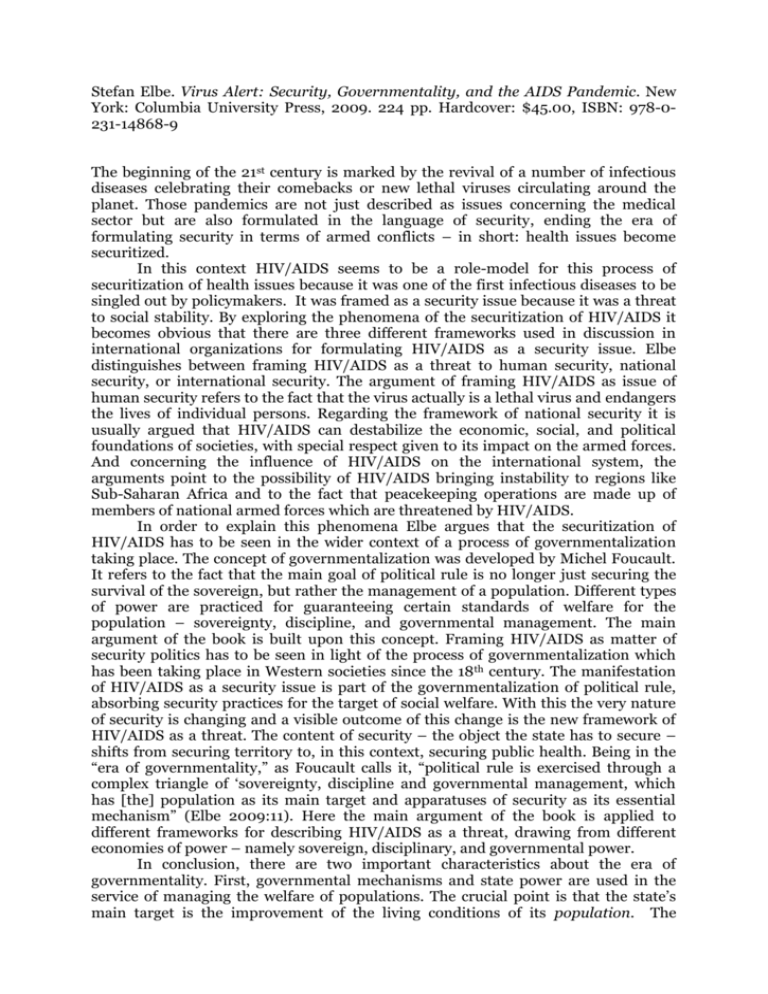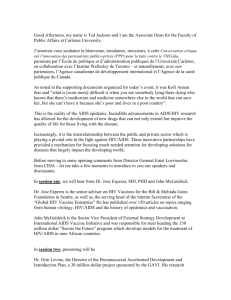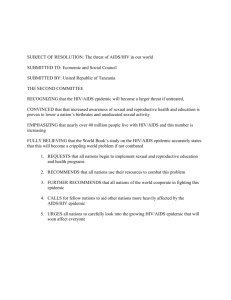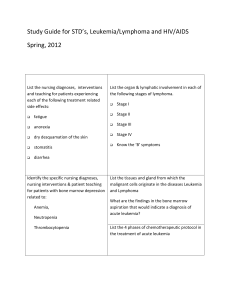Stefan Elbe - Global Health Governance
advertisement

Stefan Elbe. Virus Alert: Security, Governmentality, and the AIDS Pandemic. New York: Columbia University Press, 2009. 224 pp. Hardcover: $45.00, ISBN: 978-0231-14868-9 The beginning of the 21st century is marked by the revival of a number of infectious diseases celebrating their comebacks or new lethal viruses circulating around the planet. Those pandemics are not just described as issues concerning the medical sector but are also formulated in the language of security, ending the era of formulating security in terms of armed conflicts – in short: health issues become securitized. In this context HIV/AIDS seems to be a role-model for this process of securitization of health issues because it was one of the first infectious diseases to be singled out by policymakers. It was framed as a security issue because it was a threat to social stability. By exploring the phenomena of the securitization of HIV/AIDS it becomes obvious that there are three different frameworks used in discussion in international organizations for formulating HIV/AIDS as a security issue. Elbe distinguishes between framing HIV/AIDS as a threat to human security, national security, or international security. The argument of framing HIV/AIDS as issue of human security refers to the fact that the virus actually is a lethal virus and endangers the lives of individual persons. Regarding the framework of national security it is usually argued that HIV/AIDS can destabilize the economic, social, and political foundations of societies, with special respect given to its impact on the armed forces. And concerning the influence of HIV/AIDS on the international system, the arguments point to the possibility of HIV/AIDS bringing instability to regions like Sub-Saharan Africa and to the fact that peacekeeping operations are made up of members of national armed forces which are threatened by HIV/AIDS. In order to explain this phenomena Elbe argues that the securitization of HIV/AIDS has to be seen in the wider context of a process of governmentalization taking place. The concept of governmentalization was developed by Michel Foucault. It refers to the fact that the main goal of political rule is no longer just securing the survival of the sovereign, but rather the management of a population. Different types of power are practiced for guaranteeing certain standards of welfare for the population – sovereignty, discipline, and governmental management. The main argument of the book is built upon this concept. Framing HIV/AIDS as matter of security politics has to be seen in light of the process of governmentalization which has been taking place in Western societies since the 18th century. The manifestation of HIV/AIDS as a security issue is part of the governmentalization of political rule, absorbing security practices for the target of social welfare. With this the very nature of security is changing and a visible outcome of this change is the new framework of HIV/AIDS as a threat. The content of security – the object the state has to secure – shifts from securing territory to, in this context, securing public health. Being in the “era of governmentality,” as Foucault calls it, “political rule is exercised through a complex triangle of ‘sovereignty, discipline and governmental management, which has [the] population as its main target and apparatuses of security as its essential mechanism” (Elbe 2009:11). Here the main argument of the book is applied to different frameworks for describing HIV/AIDS as a threat, drawing from different economies of power – namely sovereign, disciplinary, and governmental power. In conclusion, there are two important characteristics about the era of governmentality. First, governmental mechanisms and state power are used in the service of managing the welfare of populations. The crucial point is that the state’s main target is the improvement of the living conditions of its population. The MARINA KARBOWSKI, REVIEW OF VIRUS ALERT 2 increase of the sovereign’s strength is not the main purpose of political rule, but rather the welfare of the population. With the rise of the era of governmentality the population is established as political category, and with this the population becomes the main referent object for politics. Second, different forms of power are being utilized. Sovereign power and disciplinary power are older types of power which existed before the era of governmentality. Those forms have undergone a transformation insofar as they are now also serving the management of welfare of populations. They are no longer used to augment the power of the state but to improve the living conditions of the state’s population. Population in this understanding is more than just the sum of individuals. It is “a totality of elements, in the midst of which one can find a certain number of variables that influence and mold the population and that are amenable to productive modification” (Elbe 2009:62). With this new understanding of population the practices of security move away from securing the survival of the political body, the sovereign. Practices of security are more often used to manage the welfare of the population, which is actually the goal of political rule. Security practices become absorbed during the era of governmentalization. Institutions of security become more and more concerned with the management of the well-being of the population. In his next step, Elbe connects the different HIV/AIDS frameworks with the different mechanisms of the three types of power in order to show why the different frameworks of HIV/AIDS are used in argumentations, although they are empirically vague. Governmentality is used as an analytical framework for explaining the securitization of HIV/AIDS in its different forms. Framing HIV/AIDS as a human security threat leads to the mobilization of a disciplinary economy of power. Understanding the infection as a threat to the corporal well-being of individuals is visible in the Human Development Report of UNAIDS, for example. The practice of the disciplinary economy of power is surveillance. The individuals of the population are observed on the basis of a special norm – in this case being HIV-negative. Those individuals who do not meet this norm are not expelled from society but a set of policies will be implemented which aim at the deviated persons. The aim is to bring them back in again and to make them meet the norm. Regulations on the behavior of every single person are proposed for making them fulfill the norm. In the case of HIV/AIDS, we can find this in proposed regulations on sexual behavior. The framework of HIV/AIDS as national security threat draws on sovereign economy of power. The risk of state failure – as is argued by international organizations – rises with the infection rate. As the mechanism of sovereign economy of power is the law, we can find these practices in former exclusions of HIV-positive persons from the state service. At this point Elbe reflects on security research. Because this research locates its discussion mainly in the field of sovereign power, it focuses on the relationship between the state and the individual. With the help of securitization theory, he identifies that the securitization of an issue usually leads to a greater level of state mobilization and citizens’ rights may be endangered. Elbe argues that securitization theory usually draws on sovereign economy of power, but it is not quite clear why he has to refer to it on this point. Foucault himself would have identified this danger without referring to securitization theory. As the mechanism of a sovereign economy of power is the usage of law, identifying the danger of limiting civil rights is right at hand. In a next step it is stressed that the opposite of what security theory would expect is happening. States seriously affected do not get involved in this area. Elbe argues that this indicates the change sovereign power undergoes in the era of governmentalization. It is now aimed at managing the welfare of its population instead of the survival of the sovereign. On the other hand Elbe GLOBAL HEALTH GOVERNANCE, VOLUME III, NO. 2 (SPRING 2010) http://www.ghgj.org MARINA KARBOWSKI, REVIEW OF VIRUS ALERT 3 argues that the abstinence of the state instead of state mobilization concerning HIV/AIDS can be ascribed to a strong human rights culture. Elbe seems to get bogged down with his argumentation. The reference to securitization theory confuses his argument more than it helps him to make it strong. Keeping to the focus on the analytical framework of governmentalization might have helped to make the argumentation clearer. Afterwards a critical examination of securitization theory still could follow. In the end he comes to state that using the framework of governmentality can help to generate an account of different power relations in the international system which securitization theory cannot. Although this conclusion is a quiet interesting one its importance is damaged because Elbe builds on it through two different chapters and starts arguing on that issue out of the blue. At first it does not seem clear what he wants to point to, because he started by declaring that his aim was to explain the securitization of HIV/AIDS with a Foucaultian framework. The critique on securitization theory is valid but the way it is woven into the argumentation makes its importance opaque and confuses the overall argument. Finally, framing HIV/AIDS as threat to international security draws on a governmental economy of power. Arguments in international organizations refer to datasets which analyze risk groups like peacekeepers and the armed forces. The weakening of these groups could destabilize the international system. Policies and behavioral norms are introduced for those risk groups. Governmental economy of power focuses only on risk groups and not on the whole population. With this the danger of stigmatization of risk groups comes into play. In the last chapter Elbe broaches the subject of dangers which are associated with the securitization of HIV/AIDS. Here as well he argues against securitization theory, which would advise the de-securitization of the issue. Dealing with securitization more reflexively, with more awareness of the different types of dangers, is Elbe’s conclusion on the question of how to deal with the dangers of securitization. How might one respond to Elbe’s analysis? Using the Foucaultian framework of governmentality for his analysis seems to be an interesting alternative for investigating the dynamics of the process of securitization. One weakness seems to be that he did not decide on whether he wanted to write a critique on securitization theory, show how the analytical framework of governmentality fits into this research agenda, or both. As he is actually criticizing securitization theory one would wish that he gave a short comment on possible different perspectives dealing with the securitization of health issues and why he finds it necessary to use a different analytical framework. There are only some references on the advantages of his analysis in comparison to others. There could have been some more detailed evaluation on the advantages and disadvantages of different concepts. The empirical evidence Elbe uses to support his arguments point to the Human Development Report of UNAIDS or other international organizations, like Rockefeller Foundations or World Health Organization. He gives us no information about the way he selected the information or why he did not use other information. Also there is no note on the method used for collecting the data. Elbe’s decision to use the Foucaultian concept of governmentalization opens the possibility of thinking about securitization dynamics in a more complex way – a point Elbe states but which he could have made more prominent. Also, readers not familiar with Foucault will feel comfortable with Elbe’s argumentation as he breaks the concept of governmentalization down to the essential points and explains it in plausible, easy to follow way. Concerning the audience the book wants to address, Elbe himself states that “it is primarily a book about security and more specifically still, about what the recent GLOBAL HEALTH GOVERNANCE, VOLUME III, NO. 2 (SPRING 2010) http://www.ghgj.org MARINA KARBOWSKI, REVIEW OF VIRUS ALERT 4 securitization of HIV/AIDS tells us about the nature of contemporary security practices and their wider role within international relations” (Elbe 2009:9). Marina Karbowski Marina Karbowski is a PhD candidate at the University of Munich and is studying the role of emotions in international relations. GLOBAL HEALTH GOVERNANCE, VOLUME III, NO. 2 (SPRING 2010) http://www.ghgj.org






